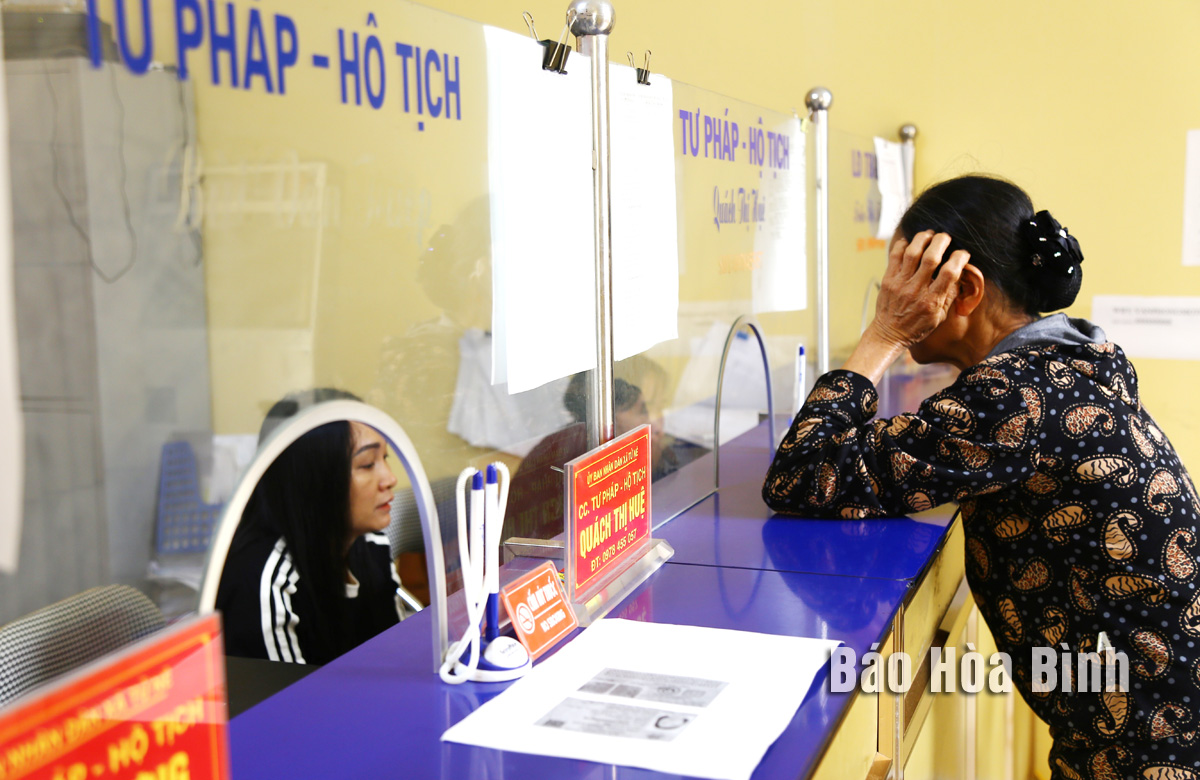
Over recent times, the implementation of the single-window mechanism for administrative procedure settlement in electronic environments at various units and localities has seen positive changes.
In Tu Ne commune, Tan Lac district, a staff at the
local section for public administrative reception and result return offers
guidance for a resident.
In Tu Ne commune, Tan Lac district, a considerable number of people arrived
early in the morning to carry out administrative procedures at the local
section for administrative reception and results return.
Bui Thi Mo shared her experience: "I came here to apply for my
grandchild's birth certificate. As it's my first time dealing with this
procedure, I was a bit confused. However, I felt relieved thanks to the staff’s
meticulous and efficient guidance."
In 2023, the mechanism was effectively executed at the provincial centre for
public administrative services as well as the reception and result return units
across all local districts, city, communes, wards, and towns. The on-time file
resolution rate by provincial specialised agencies reached 99.7%.
However, shortcomings remain such as the emergence of additional required
documents not complying with regulations and the complex and cumbersome of some
procedures. The digitisation and reuse of digitised data of files have yet to
meet requirements, while the coordination among public agencies involved in the
process remains ineffective. There has also been a failure to report, explain,
and apologise to citizens and businesses regarding overdue files, especially in
the field of land.
To overcome these limitations, the chairman of the provincial People's
Committee has instructed enhancing the role and responsibility of the heads of
agencies and further implementing the single-window mechanism as prescribed.
Also necessary are timely review, reduction and simplification of procedures
and business regulations to create convenience and reduce costs for citizens
and enterprises.
Stressing the importance of public disclosure and transparency, the leader
requested all administrative documents be digitised according to regulations
and digitisation linked to the completion of tasks by public personnel
involved.
The Standing Board of the Hoa Binh provincial Party Committee has agreed in principle on a proposal by the Standing Board of the Party Committee of Hoa Binh city to gather feedback on the city’s 1:2000 zoning plan, which forms part of its broader urban development strategy.
Hoa Binh province has made notable progress in public administration reform and digital government development, with the satisfaction index among citizens and businesses reaching over 84%, according to recent government evaluations.
Thanks to great efforts by local authorities in recent times, the governance and public administration performance of Mai Chau district has been significantly improved.
In the afternoon of June 6, the Party Committee, the People's Council, the People's Committee and the Fatherland Front of Lac Son district solemnly held a meeting to celebrate the 139th anniversary of the district's founding (1886–2025) and the 79th anniversary of the establishment of the district's Party Committee (1946–2025). There was the attendance of Mr. Bui Van Thang, the Vice Chairman of the Provincial People's Council; Mr. Quach Tat Liem, the Vice Chairman of the Provincial People's Committee; Ms. Dang Bich Ngoc, the Deputy Head of the National Assembly Delegation of the province; as well as the former leaders of the province and district through various periods, who are the natives of the district.
Implementing the Politburo’s Resolution No. 57-NQ/TW on breakthroughs in science – technology, innovation, and digital transformation is a golden opportunity for the northern mountainous province of Hoa Binh to renew growth model, improve competitive edge and shorten digital gap.
Resolution 57-NQ/TW, issued by the Politburo on December 22, 2024, identifies sci-tech, innovation, and digital transformation as strategic breakthroughs to build a developed and prosperous nation. In Hoa Binh province, this spirit is not just a slogan, it’s being put into action through concrete initiatives that form a "new development triangle”: digital citizenship, digital economy, and digital administration.



